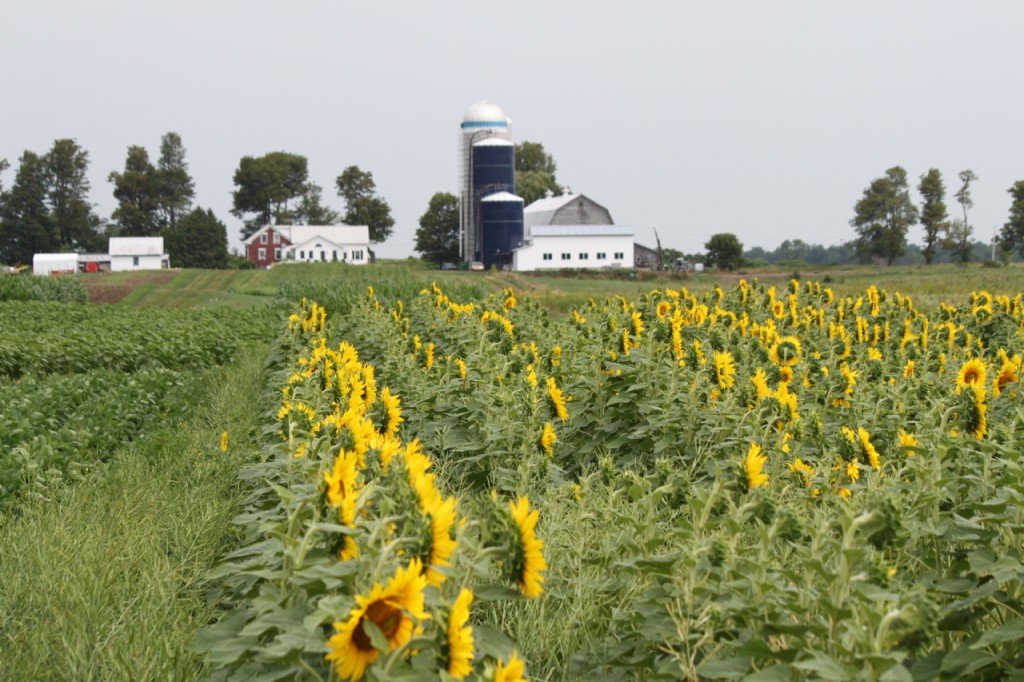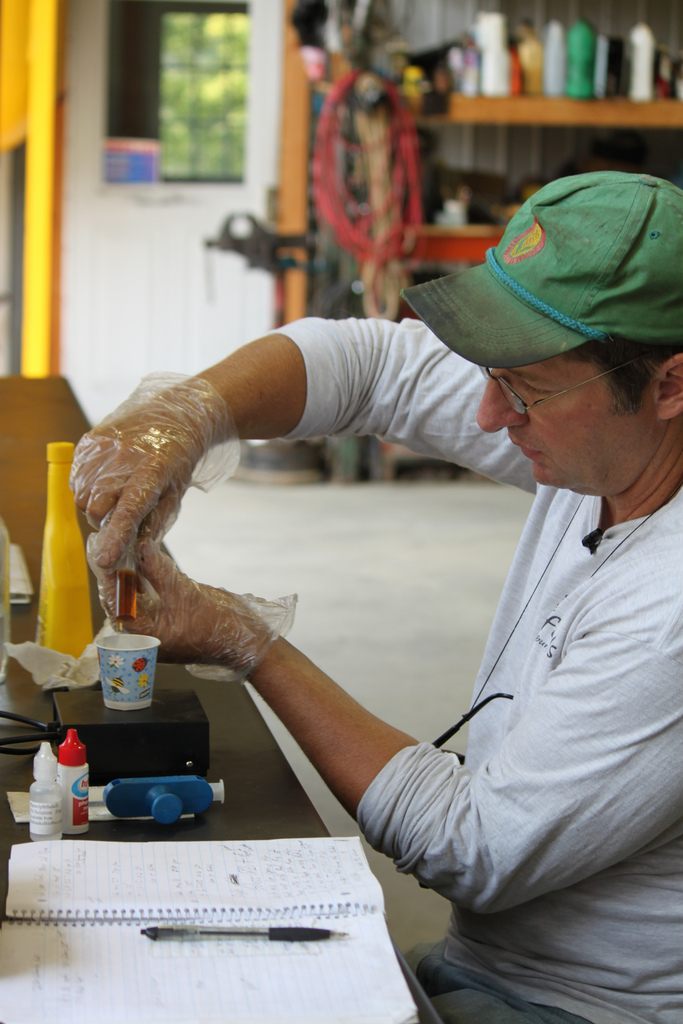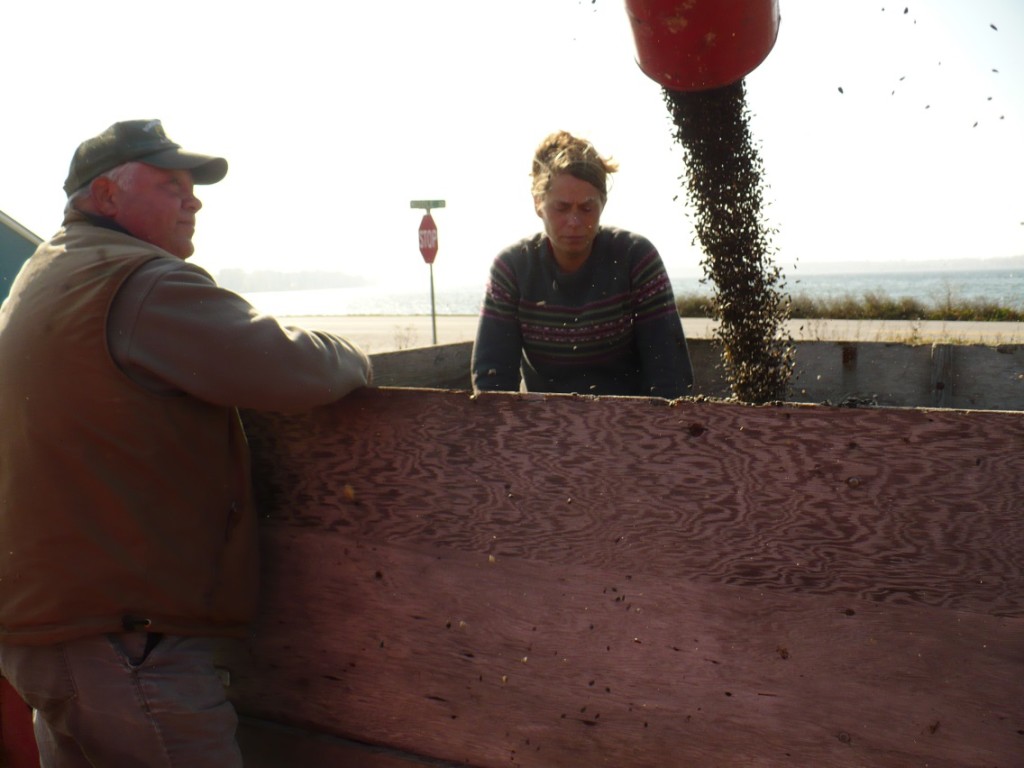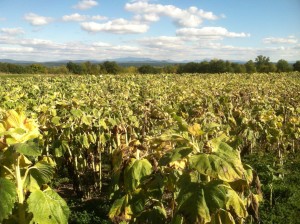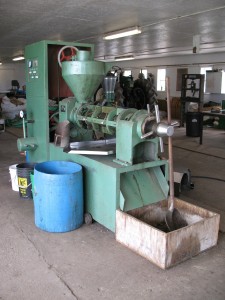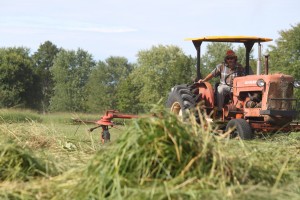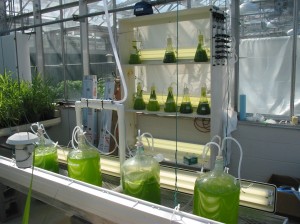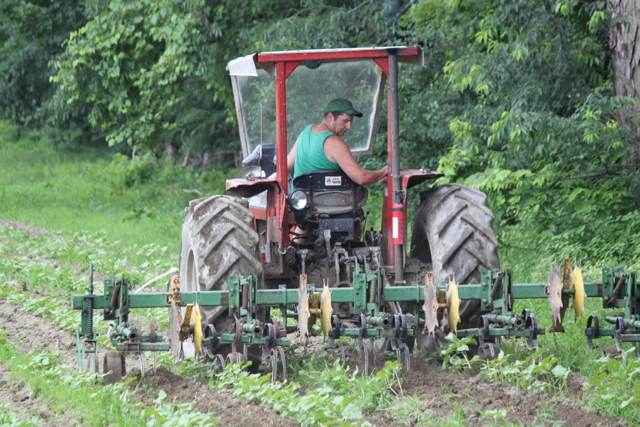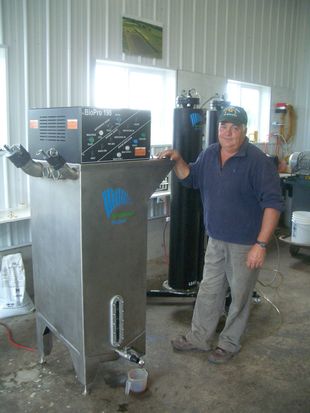A report published this week in Nature Climate Change indicated that ethanol made from corn residue can reduce soil carbon and increase CO2 emissions, indicating the harvested leftovers from corn are “worse than gasoline for global warming,” according to the Associated Press, who released the study results.
In Vermont the term “biofuel” and “bioenergy” are commonly used to refer to woody biomass (e.g., chips and pellets), anaerobic digestion (e.g., new manure and food scrap digester at Vermont Tech), and on-farm biodiesel production.
A scale-appropriate model of local bioenergy production for in-state use is being pioneered by farmers and researchers. These emerging renewable energy resources include switch grass for heating, algae production for biofuels and wastewater management, and oilseed crops for on-farm biodiesel production, equipment use, and animal feed. Since 2003, the Vermont Bioenergy Initiative has been funding research, technical assistance, and demonstration projects—along with its partners at the University of Vermont Extension—in order to develop the infrastructure to connect diversified agriculture and local renewable energy production for on-farm and community use. A new website www.VermontBioenergy.com provides a series of written and video resources in these emerging fields of bioenergy.
“Local oilseed biodiesel production for local use is profoundly different from national and international models of biofuel production. While corn-based ethanol and palm oil biodiesel are gaining negative attention for their impacts on the environment and food security, biofuels that are produced and used locally help transition away from unsustainable models of food and fuel production,” states Sarah Galbraith, program manager of the Vermont Bioenergy Initiative. “Local production for local use works well in conjunction with sustainable food production.”
Vermont is particularly dependent on fossil fuels for heating and transportation, sending its energy dollars largely out of state. In the case of locally produced biodiesel, three products can be made from one crop: animal feed, organic fertilizer, and biofuel for heat, transportation, and farm equipment.
US corn-based ethanol mandates are bringing additional acres into mono-crop production, in some cases converting sensitive natural areas like native grasslands and forestland into farmland. In contrast, local bioenergy production for local use incorporates rotational crops like sunflowers and soybeans into acres already in production. Vermont farms growing oilseed crops for biodiesel production are doing so on long-established cropland in the context of diversified and sustainable food production.
The ethanol mandates are raising grain costs nationally, making feed expensive for Vermont dairy farmers. Local bioenergy production, however, means farmers produce their own feed, fuel, and fertilizer for on-farm use, at a fraction of the cost and at more stable prices.
The Vermont Bioenergy Initiative’s newly launched website features an in depth look at oilseed production and biodiesel operations with case studies, research, and educational videos. The website also features similar resources for grass energy and algae for biofuel and wastewater management as well as information on other biofuels being produced and used in Vermont. www.VermontBioenergy.com
###
The Vermont Bioenergy Initiative draws the connection between diversified agriculture and local renewable energy production for on farm and community use. Aiming to supply farm inputs and reduce fossil fuel consumption, this program supports research, technical assistance, and infrastructure development in emerging areas of bioenergy. Since 2003 the program has focused on biodiesel production and distribution for heating and transportation, oil crops for on-farm biodiesel and feed, grass for heating, and algae for biofuels and wastewater management. The Vermont Bioenergy Initiative works with biodiesel producers including State Line Biofuels and the Farm Fresh Fuel Project at Borderview Farm and grass pellet research through UVM Extension and is supported financially by US Department of Energy congressional appropriations secured by US Senator Patrick Leahy. The Vermont Bioenergy Initiative is a program of the Vermont Sustainable Jobs Fund—a non-profit organization created by the Vermont Legislature in 1995 to accelerate the development of Vermont’s green economy in the fields of renewable energy, sustainable agriculture and forestry.
14 Apr 2014
Farm Fresh Fuel 2014
This guest post was contributed by Hannah Harwood and Dr. Heather Darby at UVM Extension Northwest Crops and Soils Program.
Travel Route 2 through Grand Isle County in early August this year and the rolling yellow fields along the roads will undoubtedly catch your eye. Sunflowers will be in bloom and, more than likely, tourists will be snapping photos. For the second year, growers throughout the county will be participating in a project that supports a small community of individuals who will be producing their own biofuels.
The Farm Fresh Fuel Project—created by UVM Extension’s Northwest Crops & Soils Program and the Vermont Bioenergy Initiative (VBI)—began in 2012 with about a dozen interested growers and 69 acres of sunflowers planted in the islands. Grand Isle County was chosen because it is a agriculturally-diverse community with some existing resources and experience in oilseed production. Participating growers, who signed up in each town in the county in 2012, ranged from seasoned dairy farmers to homesteaders trying their hand at crop production for the first time. All were grateful that the project was taking place in close proximity to technical assistance, equipment, and experienced growers.
That’s the whole idea of the Farm Fresh Fuel Project: developing a small community of individuals who can produce biofuels from the seed to the tank, in a place where the resources already exist to help along the way. Farm Fresh Fuel serves as a sort of small case study for alternative crops and small-scale biofuel production. If all Grand Isle County farmers integrated some amount of biodiesel into their operation, the county could be the first in the nation to have all of its agricultural producers using alternative energy.
Growers who want to participate in the project are responsible for providing the land, meeting fertility requirements, and arranging for planting, cultivation and harvest. In exchange, UVM Extension provides soil tests and interpretation, sunflower seed, technical crop production assistance, and in-season monitoring and insect scouting. After harvest, growers have the option of getting the seed processed at Borderview Farm in Alburgh, a facility with the on-site capacity to clean, dry, and press seed, as well as process raw oil into biodiesel.
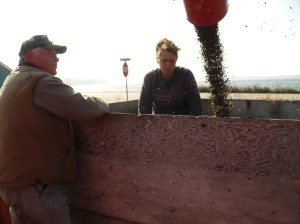
Farm operator Roger Rainville and UVM Extension agronomist Heather Darby watch the sunflower seed flow out of the combine on West Shore Road in Alburgh, 2012. Credit: Hannah Harwood.
In 2012, the average sunflower seed yield was approximately 1400 lbs per acre, though the success of individual fields ranged drastically from one to the next. The most problematic obstacles for Grand Isle producers were birds and weeds, both of which are concerns for almost every oilseed grower in the Northeast. Overall, 28.3 tons of seed were harvested from the county, and Roger and Natasha Rainville at Borderview Farm pressed 2,750 gallons of oil for participating growers, enough to make 2150 gallons of biofuel. When the oil was pressed, what was left was 15.9 tons of sunflower meal—which some participants used to feed livestock or fertilize their vegetables, and some sold to other farmers in the county. Overall, there was a buzz of excitement about these new value-added products—oil, meal, and/or fuel—being produced right in the county.
Though there was increasing interest and an abundance of good intention in 2013, weather conditions in May and June (namely 6.9” of rain above standard 30-year averages) prevented most anticipated fields from being planted on time or at all. The fields that were successfully seeded had decent yields, but the project in general was delayed for a year, giving growers, processors, and weathermen a chance to regroup.
UVM Extension and VBI are excited to facilitate this project again in 2014, with renewed interest from 2012 growers as well as interest from farmers and landowners new to Farm Fresh Fuel. After hosting an informational meeting on March 27 and gauging interest, UVM Extension estimates that at least eight growers will participate this year, putting approximately 60 acres into oilseed crop production for fuel, feed, and fertilizer that’s grown right in their backyard. If the weather cooperates, planters will start rolling through fields in May, and little green sunflower shoots will be visible from the road by June.
09 Apr 2014
Emerging Frontiers in Bioenergy
Green Energy Times is an independent media company that publishes and energy independent website and newspaper. The power used to design the print publication and operate the website is completely off-the-grid and solar powered. Green Energy Times publishes all ranges of renewable energy and climate action news and articles from across Vermont and the region.
The Vermont Bioenergy is pleased to be authoring a regular column entitled Emerging Frontiers in Bioenergy. We plan to share each upcoming article on the Field Notes part of this website, and to get you up-to-speed, we wanted to share the first three in the series:
Oilseeds, Grass & Algae Each Hold a Place in Vermont’s Renewable Energy Future
This article reviews how bioenergy refers to renewable energy fuels and feedstocks derived from forest and agricultural biomass, liquid biofuels, and biogas to be used for heat, electricity, or vehicle fuel.
Grass Energy: State of the Science
This article explores the potential for grasses grown on marginal lands in Vermont to meet a portion of the state’s heating demand and reduce the consumption of fossil fuels and the study being conducted to assess the opportunities.
From Ponds to Fuel Tanks: The Role of Algae in our Energy Future
In this article, algae production is discussed as an excellent source of oil for making biodiesel, which could displace substantial volumes of petro-diesel for heating and transportation.
Learn more about Green Energy Times at www.GreenEnergyTimes.net and the Vermont Bioenergy Initiative at www.VermontBioenergy.com.
April 8, 2014, 1 p.m. Eastern Time
On-Farm Oilseed Pressing for Fuel and Food (link to webinar)
Chris Callahan, Extension Agricultural Engineer, University of Vermont
Douglas Schaufler, Research Associate, Ag Bio Engineering, Penn State
Wondering how oilseed crops like sunflower, soybeans and canola are used on-farm for liquid fuel replacement and feed production? This webinar describes small-scale extraction with examples of different oilseed press usage and and additional processing steps such as filtering and storage. Oil produced on-farm can then be used directly as straight vegetable oil fuel or changed into biodiesel for equipment use. Oilseed meal left following oil extraction is then used for animal feed and other uses. Some farms are diverting a portion of the oil produced into edible oils for consumer sales.
03 Apr 2014
Sustainable Farm Energy: 2014 Virtual Tours
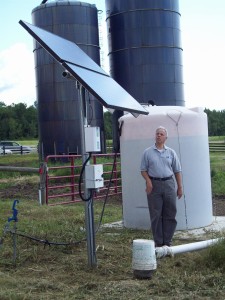 Are you looking to stabilize rising fuel and energy costs on your farm or homestead? Are you seeking more sustainable sources of energy? In this upcoming four-part webinar series, you’ll meet an organic vegetable farmer, grape grower & winemaker, sunflower & biodiesel producer, and pastured livestock farmer who will lead you through a virtual tour of their sustainable farm energy systems and ecological production techniques.
Are you looking to stabilize rising fuel and energy costs on your farm or homestead? Are you seeking more sustainable sources of energy? In this upcoming four-part webinar series, you’ll meet an organic vegetable farmer, grape grower & winemaker, sunflower & biodiesel producer, and pastured livestock farmer who will lead you through a virtual tour of their sustainable farm energy systems and ecological production techniques.
This lunchtime webinar series will run from noon-1:00pm every Friday from April 4th through April 25th. All of the webinars are free and open to the public. Registration is required. Upon registering, you’ll receive an email providing a link and instructions for you to access the series.
This webinar series is sponsored by NE SARE (Northeast Sustainable Ag Research and Education) and the Cornell Small Farms Program. Please send inquiries to smallfarmsprogram@cornell.edu. To learn about funding opportunities available from NE SARE, visit www.nesare.org. To learn more about small farm resources and support, visit www.smallfarms.cornell.edu.
April 4th: Organic Vegetable Farm Cools with the Earth: Warms with the Sun
Noon – 1:00pm with Jay Armour of Four Winds Farm, Gardiner, NY
Is it possible to operate a 24 acre diversified vegetable farm with minimal energy use? Yes! Jay Armour will take us on a virtual tour of his passive-solar heated and earth-cooled straw-bale vegetable barn with attached greenhouse. At one end of the barn are two root cellars built into a hillside that store root crops throughout the winter with minimal energy use. A 14-kw grid-intertied PV electric system is situated on the barn roof, which is being financed by a combination of a NYSERDA grant and a low-interest loan. A permanent raised bed system in the vegetable garden requires very little tractor time and hence very minimal fuel use. The Armours also transport vegetables to market in a diesel van converted to run on waste vegetable oil (WVO). The farm raises produce, heirloom seedlings, grass-fed beef, pasture raised turkeys, and intermittently pasture-raised pork. Register Here | Visit Farm Website
April 11th: Family Vineyard Shrinks Carbon Footprint by 40%
Noon – 1:00pm with Art Hunt of Hunt Country Vineyards, Branchport, NY
Since 2007, Hunt Country Vineyards has reduced total energy costs on their vineyard by 30% and their carbon footprint by more than 40%. How have they gone about it? Art Hunt will lead us on a virtual tour of their energy efficient winery, newly insulated warehouse, geothermal heating and cooling system, and vertical wind turbine. In 2012 the Hunts launched a Locavore Room which celebrates the bounty of local foods and beverages in the Finger Lakes. The Hunts are proud to say that all food & beverage items (other than wine) they offer for sale on the farm travel an average Distance-from-Source (DfS) of just 162 miles. Art will also share a variety of ecological production techniques. For example, in 2005, the Hunt family began mixing grape pomace with animal manure and then composting the mix before applying it to the vineyard. The compost adds vital minerals and nutrients to the soil that help produce outstanding grapes for winemaking and reduce the use of other fertilizers. Register Here | Visit Farm Website
April 18th: Sunflowers & Canola to Fuel: Dairy Becomes Biodiesel Production Facility
Noon – 1:00pm with Roger Rainville of Borderview Farm, Alburgh, Vermont
Interested in making biodiesel on your farm or in cooperation with other farmers? Roger Rainville will take us on a virtual tour of his former dairy-turned-energy farm in Alburgh, Vermont. In 2008, when diesel prices rose from $4 to $5 per gallon, Roger began planting sunflowers and canola on a portion of his 214 acres and installing biodiesel processing equipment. He harvests the oilseed with a combine, and uses a seed cleaner and grain dryer to prepare the seed for storage in a 60-ton grain bin prior to processing. He’ll show us how he presses the seed to get two products: oil for biodiesel and pelletized meal for feed or to burn in a pellet stove. He then sends the oil through a BioPro 190 automated biodiesel processor which can process 100 gallons of oil to fuel per day. Learn more about his equipment and the seed to fuel process by tuning in to this video. Cosponsored by the Vermont Bioenergy Initiative. Register Here | Visit the VBI Website
April 25th: Thirsty Livestock? Use Sun or Wind to Power a Remote Watering System
Noon – 1:00pm with Jonathan Barter of Barter Farm, Branchport NY
Are you getting tired of hauling water to livestock in remote pastures? Jonathan Barter will show us the renewable energy powered watering system on his 210 acre livestock farm (40 Angus cattle and 130 Cheviot and Dorset sheep). In 2010, Jonathan installed a combination wind and solar pumping system which supplies water to 58 acres of pasture. The pumping system consists of a 350 watt turbine, 400 watt solar panels, back up batteries and a deep well pump. Partial funding for this project was provided by USDA – Natural Resources Conservation Service’s Conservation Innovative Grants program. Register Here




